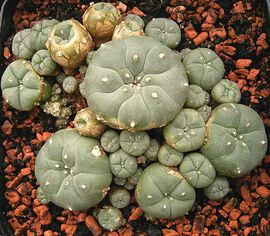This is an unofficial archive of PsychonautWiki as of 2025-08-11T15:14:44Z. Content on this page may be outdated, incomplete, or inaccurate. Please refer to the original page for the most up-to-date information.
Lophophora williamsii: Difference between revisions
Jump to navigation
Jump to search
>Oskykins m Oskykins moved page Lophophora williamsii (Botany) to Lophophora williamsii (botany): Text replacement - "(Botany)" to "(botany)" |
>White No edit summary |
||
| Line 1: | Line 1: | ||
{{BotanyBox/Lophophora williamsii}} | {{BotanyBox/Lophophora williamsii}} | ||
'''Lophophora williamsii''' also knows as '''Peyote''' or '''Peyotel (Spanish)''' is a spineless cactus with psychoactive alkaloids like [[mescaline]]. Native North Americans are likely to have used peyote, often for spiritual purposes, for at least 5,500 years. | '''Lophophora williamsii''' also knows as '''Peyote''' or '''Peyotel (Spanish)''' is a slow growing spineless cactus with psychoactive alkaloids like [[mescaline]].<ref>http://www.ncbi.nlm.nih.gov/pubmed/5065448</ref> Native North Americans are likely to have used peyote, often for spiritual purposes, for at least 5,500 years. | ||
==Varieties== | |||
==External links== | ==External links== | ||
*[https://en.wikipedia.org/wiki/Peyote Peyote (Wikipedia)] | *[https://en.wikipedia.org/wiki/Peyote Peyote (Wikipedia)] | ||
| Line 8: | Line 12: | ||
[[Category:Plant]] | [[Category:Plant]] | ||
[[Category:Cactus]] | [[Category:Cactus]] | ||
==References== | |||
Revision as of 11:08, 20 September 2016
| Lophophora williamsii | |
|---|---|
 Peyote in a pot. |
|
| Taxonomical nomenclature | |
| Kingdom | Plantae |
| Unranked | Angiosperms |
| Unranked | Eudicots |
| Unranked | Core eudicots |
| Order | Caryophyllales |
| Family | Cactaceae |
| Genus | Lophophora |
| Species | L. williamsii |
| Common nomenclature | |
| Common names | Peyote, Peyotel (in Latin America) |
| Constituents | |
| Active constituents | Mescaline, Pellotine, Hordenine, etc. |
Lophophora williamsii also knows as Peyote or Peyotel (Spanish) is a slow growing spineless cactus with psychoactive alkaloids like mescaline.[1] Native North Americans are likely to have used peyote, often for spiritual purposes, for at least 5,500 years.